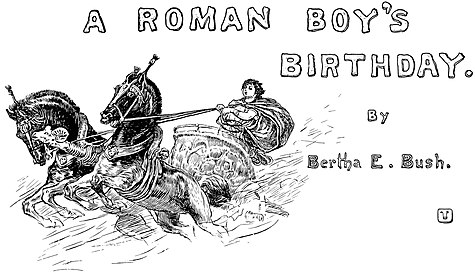
The fiery steeds pranced and curveted. The heavy, unsteady chariot, as clumsy as it was magnificent, rocked from side to side. A hundred hands were ready to take the reins should the emperor’s young son give the nod; but, though his arms seemed almost pulled from their sockets and his footing shifted with the swaying chariot, he would not give up. Boys were expected to be hardy and fearless in those days. Young Greta had already been two years with his father in the army, sleeping uncomplaining, if need be, on the bare ground, eating anything or nothing, seeing sights which our bravest men could hardly bear. He was a frank and friendly little fellow, whose greatest pride was to endure all the hardships that the Roman soldiers suffered. What wonder that the whole army loved him, and that the emperor, Septimius Severus, preferred him to his sullen older brother, Caracalla!
When the brilliant cortège reached the amphitheater where the games were to be held, Geta was placed in the seat of honor at the right hand of the emperor, and a happier face than his never looked down upon an assembled audience. At the left, with a brow as black with anger as Geta’s was bright with happiness, sat the older son, Caracalla, whose heart was full of bitterness at this honor paid to his brother.
It was a little provincial town. The amphitheater did not begin to compare with the wonderful Colosseum at Rome. The citizens had made great effort to adorn it suitably for the emperor. The place reserved for his train was hung with the richest draperies the time produced, but it was not as far removed from the seats of the common people as was most fitting to the Roman ideas of etiquette. Caracalla scowled as he took his purple-draped seat; for the mass—the vulgar herd, as he called them contemptuously—were so near that he could have touched them with his hand.
Geta, with shining face, watched every movement of the wrestlers, Caracalla looked idly about with eyes of disdain. At last the climax seemed to have come. The whole amphitheater was silent in breathless interest; even Caracalla began to show some faint sign of attention, One combatant after another had been downed by one stalwart Roman soldier, who now challenged the world. Just at that moment a luckless slave child from a tier of seats above Caracalla’s left hand leaned too38
